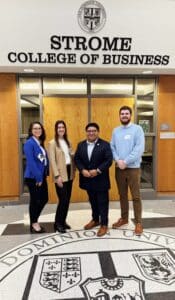
UNC MPA Students from left: Angel Padilla, Allie Omens, Lorenzo Pedro, Ben King
In early March 2024, the UNC MPA program sponsored four current students to participate in the annual NASPAA Student Simulation Challenge. The Challenge invites NASPAA-affiliated program students to participate on teams from other NASPAA-accredited schools in a competition with a cash prize to help solve a particular public sector challenge. This year’s topic was on ‘humanitarian aid and refugee asylum programs’. Paired with other students from Villanova University and Georgia Southern University, UNC MPA students Ben King, Angel Padilla, Lorenzo Pedro, and their teammates won the 2024 NASPAA Simulation Challenge.

UNC MPA Students from left: Angel Padilla, Allie Omens, Lorenzo Pedro, Ben King
Teams were tasked with serving leaders of countries confronted with the sudden arrival of refugees fleeing a war zone. They had to decide which policies to implement to get the best results for their country’s economy, stability, and international reputation. Some policy choices focused on border control, housing, and education, and decisions had to be made while staying within a strict budget. The students also negotiated a regional response, allocated limited resources, and weighed short-terms costs against long-term benefits.
Competition participant Allie Omens, an online UNC MPA student living in Nashville, TN and working for Metro Nashville Waste Services leading outreach efforts, said the experience left her better equipped to navigate tough decisions as a public administrator.
“In our post-simulation debrief with Competition staff, one thing we discussed was the idea of ‘selective equity’. At the start of the simulation, most countries embraced generous aid packages and relaxed asylum policies. But as the simulation went on, the necessity to manage our budgets compelled many of us to scale back assistance. This led to the difficult task of deciding which refugees merited our country’s assistance, creating a genuine moral dilemma. As people striving to be equitable public administrators in real life, facing these simulated choices compelled us to face the discomfort of complex humanitarian crises and other wicked problems.”
As in real-life public sector roles, the students had competing interests and goals as assigned before the competition. The challenge is similar in many other workplaces—how to balance multiple priorities within the group while putting together a collaborative plan to reach a shared goal.
Lorenzo Pedro, another online UNC MPA student from Morganton, NC works as a Legislative Liaison for the North Carolina Department of Transportation and intends to use the MPA degree to better inform himself on collaboration between governments and nonprofit organizations.
He found the competition to be stimulating practice and preparation for a real public sector situation. “Each round offered valuable insights into impactful proposals concerning the immigrants we were helping and our citizens. We also recognized the unpredictable nature of policy implementation, stressing the need for adaptability and flexibility in our approach.”
Each year, the UNC MPA program sponsors students to participate in this theory to practice professional development opportunity.
Looking back on the experience, participant Ben King reflected that “my biggest takeaway from the event was the ability to connect with other students interested in public service from across the country. Everyone was super nice, and we were able to make some good friends who we will still keep in contact with.”
Angel Padilla, another participant in the simulation, summed it up succinctly.
“Through this opportunity, I gained experience making critical decisions under strict time constraints, applied budget management skills through frequently changing costs, and improved my debating skills.”
This Fall we welcomed 29 new students into the online format of our MPA. They come from different geographic regions, bring varied interests and experiences, and we are so happy they chose us. Read about 3 of them here!
Hometown: San Diego, CA
Alma mater: UNC-Chapel Hill
Degree: Bachelor’s degree in Public Policy
Where were you before you joined the MPA program?
I attend the online MPA@UNC program from Nashville, Tennessee where I lead education and outreach efforts for Metro Nashville Waste Services, a division of metropolitan government. I develop waste reduction programs and promote resilient waste, recycling, and composting collection for Nashville residents.
I was born and raised in San Diego, California and I attribute my passion for local environmental regulation from growing up surrounded by these policies in my own community. I took this passion with me to Chapel Hill when I attended Carolina for my undergraduate studies in Public Policy and Environmental Studies. I would not be where I am without the expertise and guidance from UNC Public Policy faculty, and I am thrilled to be returning virtually to Carolina to further my skills for public service.
What are your areas of interest in the program?
I was drawn to the MPA@UNC program because of its clear focus on building public service leaders. I have already enjoyed meeting fellow public servants in my first semester classes – some of my classmates are city planners, librarians, civil affairs officers, municipal information technology managers, and elected officials. I enjoy opportunities to get to know my classmates and learn from their specialized experiences within public service.
I also plan to concentrate in Local Government, which includes coursework such as City and County Management, Productivity Improvement in Local Government, and Governmental and other Nonprofit Accounting and Reporting. I look forward to learning a deeper understanding of local government structure and function through this coursework.
Why did you decide to get your MPA at UNC?
Through my combination of undergraduate and professional work experience in waste reduction, I envision a career path for myself championing solid waste regulation to serve communities across the United States. The MPA@UNC curriculum provides the academic and public service framework that will position me for greater professional success in this field.
It is an honor to be furthering my public administration education at my alma mater and the country’s first public university. I value that Carolina faculty are committed to understanding and improving government.
Hometown: Richmond, Virginia
Alma mater: Hampton University
Degree: Bachelor’s degree in Finance
Where were you before you joined the MPA program?
Before I joined the MPA program I was doing a few things. First, I am currently a Bank Examiner at the Federal Reserve Bank of Richmond. Second, I am a JV Football Coach at Glen Allen High School. For me this is my day-to-day life, and those two roles definitely keep me busy.
What are your areas of interest in the program?
There are many things about the program that interest me but so far my intro to public administration course has kept my attention the most. To see the connection between how governments interact with each other has super interesting and has opened my eyes to the roles we can play in public administration.
Why did you decide to get your MPA at UNC?
I decided to get my MPA from UNC because I have always wanted to be a Tarheel. My parents used to bring to the football games as a kid and I loved the Tarheel spirit. In addition to that, my mentor at the Federal Reserve went through the MPA program here and loved it! So I truly only had one option.
Hometown: Royal Oak, Michigan
Alma mater: Michigan State University
Degree: Bachelor’s degree in Social Relations and Policy
Where were you before you joined the MPA program?
I graduated from Michigan State University in 2014 with an undergraduate degree in Social Relations and Public Policy. I then began working at a high school in Detroit through the College Advising Corps, an AmeriCorps program. After my AmeriCorps service ended, I moved to Washington, DC, where I began working in program operations at the Relay Graduate School of Education—a nonprofit institution of higher education that provides a variety of professional development programs to teachers and school leaders across the country. I now live back home in Metro Detroit.
What are your areas of interest in the program?
I have greatly enjoyed the trajectory of my career thus far, working in direct community outreach, program operations, and partnership development. I am eager to get better at the work that I have been doing and to learn how to be a stronger leader at public service institutions. The MPA@UNC covers topics that I am interested in—for example, how can I be a strong organizational leader, particularly in the nonprofit space? How can I better collect, interpret, and react to data? How can I be a good steward of public dollars?
Why did you decide to get your MPA at UNC?
The MPA@UNC was my top choice when looking at graduate programs. This program is offered online, which would allow me to stay in Michigan, stay in my current role, and ensure a strong alumni network both in and out of North Carolina. The interactive structure of the program ensures that I will have the opportunity to engage in the material, not just complete asynchronous assignments. Finally, I was excited at the opportunity to visit campus and meet fellow students at an Immersion weekend on campus.

Students take a sip from The Old Well on the first day of classes on the campus of the University of North Carolina at Chapel Hill. August 21, 2023.
(Jon Gardiner/UNC-Chapel Hill)
The waning days of August bring new academic terms for students enrolled in both the on-campus and online formats of the UNC Master of Public Administration program. UNC MPA students represent a wide range of professional experiences, academic disciplines, interests, and career ambitions—but all are bound by a common interest in public service.
Below, we caught up with some of the newest Tar Heels joining the program this fall both in-person and remotely. Read on to meet a few of these current and future public service leaders.
Hometown: Denver, North Carolina
Alma mater: UNC-Chapel Hill
Degree: Bachelor’s degree in psychology and English with a minor in creative writing
Where were you before you joined the MPA program?
Prior to returning to UNC, I was participating in a two-year fellowship with the Town of Spencer through the School of Government called Lead for North Carolina. I am continuing to work for the Town while I complete my MPA.
What are your areas of interest in the program?
My primary interests are community development, resident-retaining downtown development, public art, and placemaking projects. I am currently in the process of developing a downtown mural walk in Spencer that will encourage visitors to the North Carolina Transportation Museum to come across the street and engage with the community.
Dual degree with City/Regional Planning
Hometown: Coral Springs, Florida
Alma mater: Florida Atlantic University
Degree: Bachelor’s degree in criminal justice with a minor in political science
Where were you before you joined the MPA program?
Before graduating (from FAU), I was involved with two organizations: Color of Change and Florida Student Power Network. These groups are what really got me involved in community organizing and gave me a first-hand view of problems in my community. I saw how little trust community members had in the government to enact effective change and wanted to act as a bridge between community needs and actions. After graduating, I continued working with those organizations as well as others, where I got to lobby in Tallahassee with state legislatures, participate in monthly citizenship drives to help immigrants in South Florida gain citizenship, and other community organizing efforts.
Why did you decide to get your MPA at UNC?
I knew I wanted to stay in the South to see how other states were handling their own issues and how those solutions could translate to Florida, so that is what drew me to North Carolina. UNC’s MPA program emphasizes practice and theory in a way that is unique from other programs; that made me confident that I would be equipped upon graduating with the skills I need to be an effective advocate for the communities that I want to fight for. I am most interested in community and economic development at either the local or state levels because of my specific focus on being an advocate for the most disenfranchised groups in Florida.
Hometown: Raleigh, North Carolina
Alma mater: Appalachian State University
Degree: Bachelor’s degree in criminal justice
Why did you decide to get your MPA at UNC?
During my time as an intern with the Charlotte-Mecklenburg Police Department, I was able to interact with high-achieving department officers, many of whom I found had something in common: a master’s degree in public administration. After this experience, I realized to become the best law enforcement officer I could be, as well as reach the highest levels of law enforcement, I too would need to attain an MPA.
I initially had many questions about how I would fit into UNC’s MPA program, as a career in law enforcement is atypical of UNC MPA students. (Director of Admissions) Cara Robinson answered all my questions and put me in contact with current students, who assured me that the program would be beneficial to my career aspirations. A constant refrain that I heard attached to the UNC MPA program was that once you were a part of the program as a student, the program would do everything in its power to help you succeed. This gave me a great sense of comfort with the program and made the decision to attend UNC a simple one.
What are your areas of interest in the program?
I am interested in a career in federal law enforcement after the MPA program. Leadership is invaluable to law enforcement. Being able to communicate professionally, work within and lead a team, and inspire fellow officers and citizens are all critical components of leadership in policing and are skills that I am confident will be sharpened through the MPA program.
Hometown: Birmingham, Alabama
Alma maters: Mississippi State University (B.A., M.A.), University of Southern Mississippi (MLIS)
Degrees: Bachelor’s degree in English, Master of Arts, Master of Library and Information Science
Why did you decide to get your MPA at UNC?
I decided to get my MPA at UNC because I want to build my leadership skills and learn more about how to build strong foundations for public organizations. I have seen what solid ground-level support can do for an organization, and I want to become that source of support in the organizations where I work. I am also really interested in building community both within organizations and between public entities and their communities. I love this work and want to build my strategic planning, organizational management, and personnel management skills.
What are your areas of interest in the program?
I am currently the library director at the Hocutt-Ellington Memorial Library, a municipal library in Clayton, North Carolina. I am especially interested in organizational management, internal communications, and community engagement. I believe that organizations that focus on building strong, connected teams are effective and responsive to the public.
Over the past academic year, UNC MPA piloted the Student Professional Development Grant program. This initiative provides up to $250 to every student for professional development expenses such as conference attendance, professional meetings, workshops, or professional organization membership. This funding is in addition to program-sponsored professional development like registration for the North Carolina City and County Management Association Winter Seminar and School of Government courses.
During the pilot year, the program had nine students apply for and be awarded funds. Students used the funds for experiences ranging from leadership summits and registration costs, to travel expenses for conferences. To receive funding, students must apply for development opportunities, discuss how the experience fits with their professional goals with Allison Binkley, the Associate Director of Career Services & Professional Development, and then reflect upon the experience afterwards. The sponsored experiences provided tremendous value for the students and a few shared their thoughts on the experience:
“I was able to network and meet with alumni, learn about skills needed for MPA students, and attend coaching sessions with current managers.” – Shane Digan
“Prior to the conference, I knew almost nothing about the structure and behavior of a budget office. The conference sessions introduced me to concepts like zero-based budgeting and participatory budgeting. The sessions were helpful, but nothing compares to connecting with budget professionals from across the state.” – Scott Powell
“I attended presentations ranging from the Chair of the National Endowment for the Arts, regional artists, and community development advocates, to public art funders. I also networked with arts administrators from across the South. Some of my takeaways include: grant processes for public art (specifically focusing on the story to be told with the art rather than the artists’ resume. Start with a letter of intent before accepting full proposals), considerations for equitable pay for guest artists from near and far, and how to engage communities who have been impacted or will be impacted. These takeaways were important to me as I consider foundation funding, leading proposal reviews, and equitably building community through the arts.” – Lauren Duncan ‘22
After a very successful pilot year, the MPA program is excited to continue to continue this initiative for a second year and encourage professional development relating to students’ unique interests.
Eugene Bradley grew up close to Morehead City, North Carolina, where he lived until 2012 when he accepted a full-time Kansas Air National Guard position. Currently residing in Lawrence, Kansas with his family, Bradley is now enrolled as an online student in the UNC MPA program.
Bradley decided to pursue the UNC MPA to help increase the opportunities once he retires from the military. An active advocate for guardsmen in Kansas and across the country, he expressed a desire to continue serving the public, even after he hits two decades of military service.
“I am trying to seek out opportunities that will challenge me while also allowing me to work with a new set of people,” he said.
Enrolling in the UNC MPA program has allowed Bradley to gain experience working in a non-military setting, particularly by competing in the NASPAA Simulation Challenge. This Challenge is an annual competition where NASPAA-affiliated programs invite students to participate in a competition with a cash prize to help solve a particular public sector challenge. The 2023 topic—wildfires.
Bradley was placed with a team of five other students from across the country, and participants were placed in various roles within a town task force to build the mountain town’s wildfire mitigation plan.
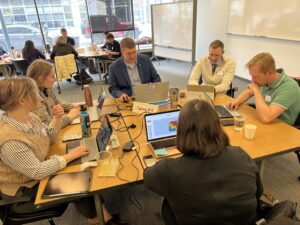
As in real-life public sector roles, the teammates had competing interests and goals as assigned before the competition. The challenge is similar in many other workplaces—how to balance multiple priorities within the group while putting together a collaborative plan to reach a shared goal.
Bradley’s travel to the competition, held in Denver, Colorado, was supported and sponsored by the UNC MPA program’s Malchus Lynn and Dr. Amanda Giannini Watlington Fund, an endowment established by alumnus Mal Watlington ’69 and his spouse. This endowment also sponsored the nomination of four other current students who participated in this year’s competition.
Following the experience, Bradley expressed gratitude in stepping outside of his comfort zone.
“More often than not, I bring back new tools or lessons that I can apply to my full-time position,” he said.
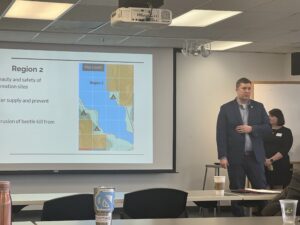
Bradley was also grateful to join a team with perspectives from incredibly diverse backgrounds. Ranging from actual wildland firefighters to more traditionally young graduate students fresh out of college, each contributed to the challenge with their differing perspectives.
“I learned a lot from this experience and especially my teammates,” he said. “We had good respect for each other and balanced our competition goals well while also having fun, ensuring it was an effective mitigation plan.”
With a focus of the competition being equitable policies, the teammates also learned how many underserved populations are often forgotten in the wildfire mitigation process. The group learned what risks the disadvantaged community members saw, including higher risk of property loss, inhalation and health concerns stemming from prescribed burns, and other results made from decisions that affect the disadvantaged.
Bradley credited the UNC MPA program for teaching him the importance of equitable policies in balancing the needs of all interested parties.
“The immense opportunities in class to debate and discuss our material helped prepare me for intense discussions we tackled during our mitigation plan with people I had never met,” he said. “I’m a better communicator, listener, and I can analyze things far better now when I hear from multiple sides.”
After he graduates in December 2023, Bradley’s plan is to stay with the military for at least another five years. After his service, his goal is to return to North Carolina with his family to work in local government and—ultimately—enjoy retirement along the coast when his public service career concludes.
Now in its 26th year at the School of Government, the UNC-Chapel Hill Master of Public Administration program has once again been named one of “America’s Best Graduate Schools” by U.S. News & World Report in its 2024 rankings.
The program improved its ranking among the top 20 public affairs programs in the nation. It is ranked 19th overall and remains the top-ranked MPA graduate program in North Carolina. This marks the 11th consecutive year UNC MPA has maintained its position among the top 25 public affairs programs in the United States.
In addition, the program retained its prestigious second-ranked position in the local government management specialty area. UNC MPA also improved its ranking in the public finance and budgeting specialty, jumping four spots to rank 22nd in the country.
The program retained its top-20 standing in the public management and leadership field, ranking 13th overall.
This year’s list—released April 25, 2023—saw numerous University of North Carolina at Chapel Hill graduate programs earn high rankings. UNC MPA joins 15 other University programs in increasing their rankings this year, including programs in the Gillings School of Global Public Health, School of Nursing, College of Arts and Sciences, School of Education, and Kenan-Flagler Business School. Rankings for graduate medical and law programs will be released at a later date.
Find all of the U.S. News & World Report rankings online.
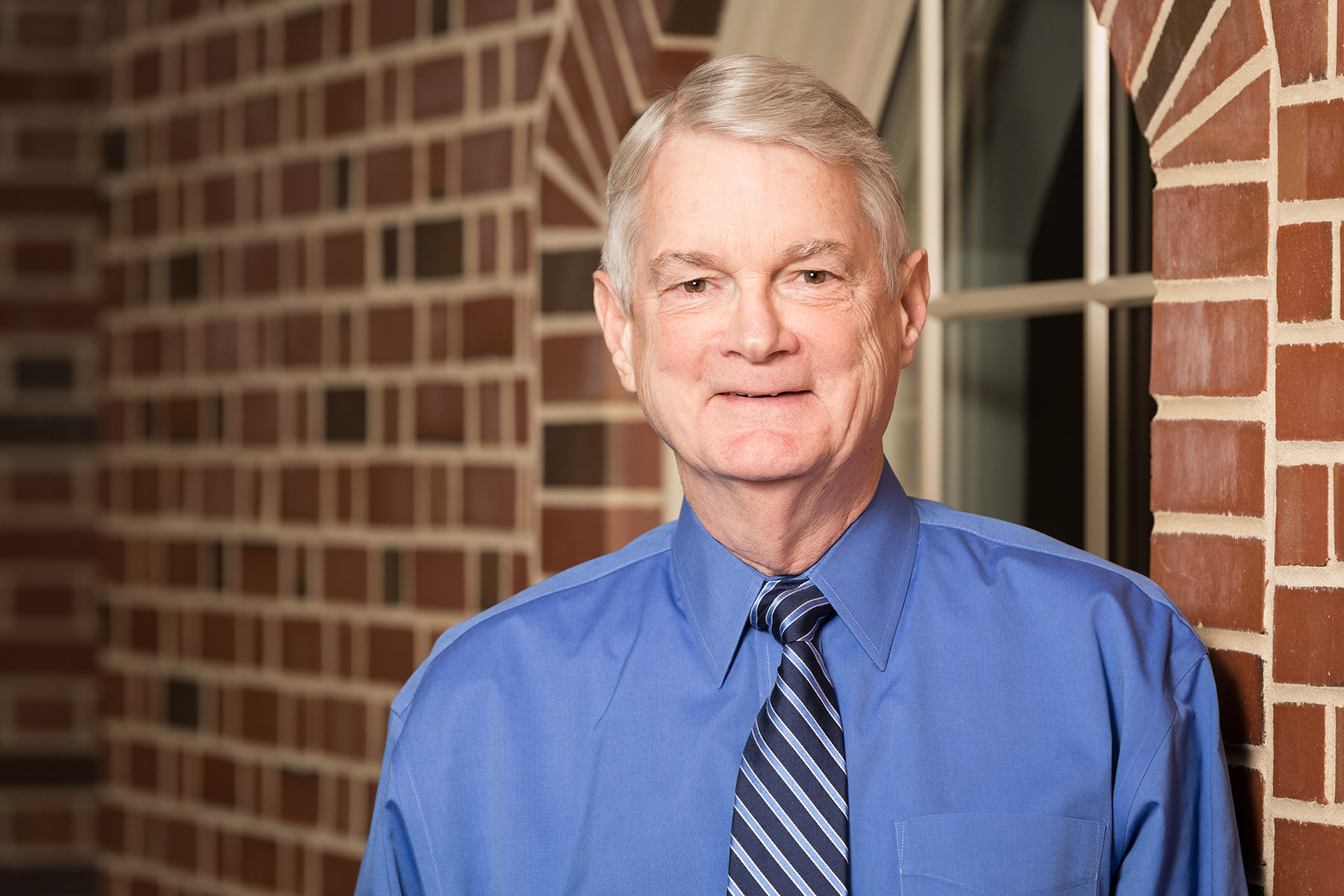
by Kathryn Paquet
When Josh Edwards ’05 enrolled at Wake Forest University as an undergraduate student in 2000, he thought he was destined for law school. While completing the required reading for his state government course, however, a name in his textbook changed everything.
“My state government textbook included a chapter about local government that the professor spent little time covering, but it caught my interest,” Edwards said. “As I read through it and followed up on the footnotes, I noted the lion’s share were attributed to a David N. Ammons. I spent time learning about Dr. David Ammons and his countless articles on local government performance management, and it brought to light a career I had never been aware of. When I applied to UNC, it was top of my list because of him.”
Edwards is joined by a long list of alumni whose UNC MPA experiences were defined by Ammons’s work, teaching, and mentorship. Having arrived at the School of Government from the University of Georgia’s Carl Vinson Institute of Government in 1996, Ammons taught countless courses to North Carolina local government practitioners and UNC MPA students alike. Within the MPA program, his resume includes courses like City and County Management and Productivity Improvement in Local Government. In 2001, Ammons was appointed MPA director, a position he served in until 2006. His career is defined by his incomparable body of work in the field of local government performance management, for which he is renowned not just across the nation but also around the world.
When Ammons was recruited by the School of Government 21 years ago, he hoped he would find a strong student body and state and local government practitioners eager to learn more about performance measurement.
“Everything reached my hopes and expectations,” Ammons remarked. “So many features of the Carolina MPA program set it apart from others. Because of our location in a School that does so much work with local governments and state agencies, a student in this MPA program has professors who know the work of governments and the challenges they face better than professors in most other programs. Their insights and connections are very beneficial to our students.
It’s been a privilege to be a professor and MPA director here, and to have had the opportunity to work with a group of wonderful colleagues and an amazing collection of students and alumni.”
After 21 years of service, Ammons began a phased retirement in 2017, stepping away from the lectern in the Knapp-Sanders building. Despite his absence from the classroom, Ammons’s impact continues to reverberate strongly as ever.
When Pat Madej ‘16 enrolled in the MPA program in 2014, he received the opportunity to work as Ammons’s research assistant. As it was for Edwards, the experience was integral to Madej’s introduction to local government and his development as a public leader.
“Working with David provided me with a great deal of opportunity—in my two years of working with him, I was able to conduct practical research that aided me in my search for a job. I even had the chance to attend a national conference with him as co-author of a published academic paper,” Madej said.
“As a first-generation college student who was new to the world of graduate school and public administration, David’s mentorship and guidance truly helped me spring into my career as a public servant equipped with the skills and experiences I needed,” Madej added.
While Madej learned a great deal about research and data from his time as Ammons’s research assistant, he also gained invaluable knowledge on how to be a strong leader— lessons he uses daily in his position as senior budget and management analyst for the City of Durham.
“The thing is, David didn’t need me to help him as his RA—it was out of what I believe is his passion for building up those around him that he let me stay on, work with him, and get my name in as a co-author on one of his papers,” Madej said. “That really meant a lot to me, and whether I’m training new budget analysts who join our team or mentoring an intern, I also do what I can to ‘pay it forward,’ and build people up so they can grow, too.”
Currently serving as assistant manager of Athens-Clarke County, Georgia, Edwards also continues to feel the impact of lessons learned from Ammons.
“As I have helped build offices focused on strategy and data, and worked to incorporate both into organizational cultures, I have often revisited his books and remembered him during tough moments when progress is slower than I hoped,” Edwards said. “Every time I have switched jobs, I have talked with David before transitioning and asked him for advice. I am thankful that my opportunity to learn from David started at UNC, but it didn’t end there. He was one of my first and best examples of what public service commitment truly means. David’s legacy is not only the many performance measurement systems set up across the world, but the hard work so many of his students do in the trenches every day, improving their communities thanks to him.”
“While David is an internationally recognized scholar on performance management, I would venture to say that it is almost impossible to measure his impact—though if anyone could do it, it would be David,” added Willow Jacobson, Robert W. Bradshaw Jr. Distinguished Professor of Public Administration and Government. “So many of us have benefited from David’s tutelage, mentorship, and friendship. For me, I know that David has made me a better scholar, teacher, and through his modeling of mentorship, I hope, a better mentor.”
In November 2019, the David N. Ammons Scholarship Endowment was created, with fundraising efforts beginning in 2020. The scholarship will support at least one student enrolled in UNC-Chapel Hill’s MPA program, with preference given to a student who intends to pursue a career in local government.
While the annual ICMA national conference serves as an invaluable resource for current and aspiring public service leaders, the cost to attend can be prohibitive for many graduate students. In 2019, a group of UNC MPA students devised a plan to bridge the gap.
The program’s ICMA student chapter reached out to the School of Government Advancement Office to look for ways to support their travel and accommodations at the upcoming national conference in Nashville.
The Advancement Office, working closely with the MPA program, reached out to UNC MPA alumni who were known to attend the conference. The response was immediate with nearly $3,000 raised in support of students hoping to attend. The generosity of these individual alumni donors—combined with support from the Public Service Enrichment Endowment—enabled all 12 members of the student chapter to travel to and stay in Nashville for the conference.
In thanking the donors, the students wrote, “It was a unique learning and networking opportunity. Every one of us returned with a variety of initiatives we hope to implement once we start our careers. … Thank you again to everyone who made it possible to push the careers of Carolina MPA students forward. Go Heels!”
Read their thank you message in the Winter 2020 issue of IMPACT.
This story appeared in the Winter 2021 issue of IMPACT.
On February 3, 2020, the City of Durham’s Budget and Management Services division held interviews for their annual summer internship position at the School of Government. Molly Gaskin ’21 was offered the position and excitedly accepted, looking forward to achieving her professional work experience (PWE) requirement and learning the inner workings of the City’s government through budget sessions, shadowing police officers, and going on solid waste ride-alongs. Then COVID-19 happened.
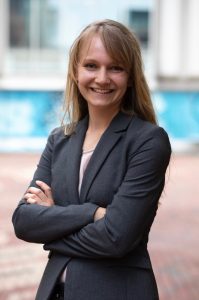
“Several parts of our job description and onboarding process instantly went out the window,” said Pat Madej ’16, Gaskin’s supervisor and senior budget and management analyst for the City of Durham. “The task of getting the actual work done felt easy but clearing these hurdles to organically meet with other staff meant we needed to get creative as we brought Molly into the department and organization’s culture.” In order to ensure Gaskin was still able to integrate into the organization, Madej created an “open-door policy” on Zoom and led daily full-team check-ins.
Additionally, Gaskin had the opportunity to lead an original qualitative research project examining whether departments considered equity implications when making budget requests. Before beginning, Gaskin had never conducted her own qualitative research.
“It was really great to be able to practice some of the techniques that we learned in our research course in an actual project that I got to see through from start to finish,” Gaskin said.
“Molly’s thorough research and fresh perspective provided us with really useful data that we will use to build on our process in the future,” Madej said. “My goal with hosting the PWE has always been to create a win for everyone, and I think we achieved that again.”
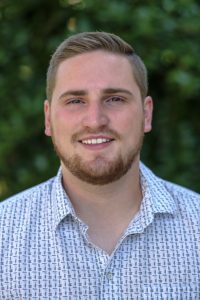
While Durham has hosted UNC MPA interns for many years, the Town of Holly Springs took the leap for the first time in 2020, hosting Clay Fleming ’21. Like Madej, Corey Petersohn ‘16 had a vision for Fleming’s PWE experience that would require re-working after the pandemic began. However, by the time Fleming started the position in May, the state had moved into phase two, so he joined Petersohn and the rest of the team in person with safety precautions.
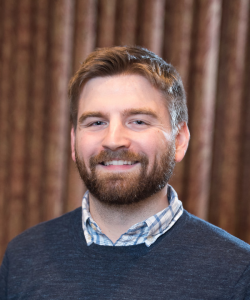
Fleming’s experience was shaped not only by the pandemic, but also by the growth of the Black Lives Matter movement after the killings of George Floyd, Breonna Taylor, and Ahmaud Arbery. As protests spread around the country, Holly Springs residents began a movement of their own to demand that funds be allocated to purchase body cameras for the police department.
“I got to sit in on conversations with council members, the town manager, police, and IT, and everyone had varying perspectives,” Fleming said. “One of the biggest skills I took away is the ability to step back and look at an issue with a bird’s eye view to investigate what’s at the heart of what’s going on and understand people’s motivation.”
Despite the curveballs thrown by the pandemic, Petersohn, like Madej, feels the PWE experience was extremely valuable.
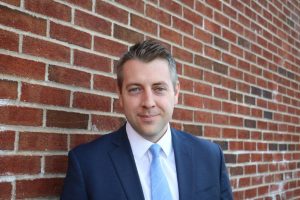
“This was the first time Holly Springs hosted a PWE, and it was a great learning experience for both Clay and us,” Petersohn said. “In the long term, by hosting an MPA intern, we are building the next generation of public service leaders. By offering these developmental opportunities to students, we are contributing to the diversity of their experiences and skill sets, from which we all can benefit.”
Interested in hosting a summer intern or learning about best practices for remote internships? Contact Kristin Pawlowski or click here to learn more.
This story was written by Makayla Hipke and appeared in the Summer 2020 edition of the iMPAct Alumni Newsletter
When the Spring 2020 academic semester at UNC-Chapel Hill kicked off on January 8, it was business as usual for MPA students, faculty, and staff. Just eight weeks later, everything would change.
As confirmed cases of the novel coronavirus (COVID-19) began to rise in the United States by late February and into early March, universities hurried to respond and create contingency plans.
Universities were quickly determined as possible hotspots for COVID-19 spread; settings posing a high risk for viral contact included dormitories and communal housing, classrooms, lecture halls, and laboratories.
On March 5, MPA Program Director William Rivenbark sent his first communication to faculty about possible COVID-19 impacts and requested that instructors begin preparing for the possibility of remote instruction for on-campus students. Students departed for spring break on March 9. By March 11, university leadership notified students that they would not return to campus after spring break.
To make a mid-semester switch to exclusively online course delivery was unprecedented, yet universities across the world were being asked to do just that. The challenges for the MPA team were multifaceted: they were attempting to communicate with students, assist faculty, follow university guidance, and care for their own families.
“The speed in which it happened made it challenging,” MPA Managing Director Heather Duhart said. “We wanted to make sure our students had the information they needed, but the university had to make those calls and communicate them to us. We had to learn to say, ‘We don’t know yet.’”
The MPA program had several advantages that helped ease the transition. Given that the program already has an online option for students, many faculty members have extensive experience teaching online. And the program’s staff is used to carrying out their work—with students and with each other—remotely.
Another advantage was the MPA faculty’s familiarity with thinking creatively about how to deliver content and achieve learning outcomes. Because MPA faculty also work in service to local and state governments, they were already accustomed to the nontraditional academic schedules and teaching approaches.
“There was a true level of care and responsibility from our faculty that paid off,” Rivenbark said. “We asked so much of them, and they took it on and made it work. It’s a true credit to them.”
The challenges, however, were undeniable. While many had resources already prepared for online instruction, others were starting from scratch. For example, faculty member Kara Millonzi had just started a half-semester course designed for in-person delivery, and needed to move it to fully remote—all while responding to local governments’ urgent questions about the pandemic and juggling familial responsibilities at home.
“The best way I can describe March and April is ‘a whirlwind,’” Millonzi said. “There was a critical period where local governments needed immediate information about the legal implications of COVID-19. I also teach a course that had just started. I was impressed with the students’ willingness to roll with the changes and their ability to continue to actively engage with the content under very challenging circumstances.”
While class delivery for the online format did not see many changes, students and faculty—like much of the world—also were experiencing the stressors and impacts of COVID-19. Many were working on the front lines of pandemic response and faced the challenges of adapting to a new normal in their own lives.
The loss of program events was keenly felt. This included end-of-year events like graduation, which was set to recognize 78 new alumni who represented graduates from the past year. Program staff and faculty sought to mitigate the impact of these challenges through online connection and have continued this focus through the summer. The MPA Alumni Board also hosted a special “welcome to the alumni ranks” happy hour event for graduates in May.
As many organizations transitioned to remote work, faced budget cuts, and furloughed employees, students were particularly concerned about the status of the Professional Work Experience (PWE) component of the MPA degree. Thanks to the support of program alumni and community partners—coupled with the perseverance of students—all students secured summer PWEs. Kristin Pawlowski, associate director of alumni engagement and employer relations, and the program were grateful for the efforts of alumni who stepped up and helped make this possible through support positions, providing feedback, and through mentorship.
“It was inspiring to see our alumni community, who themselves were on the front line of the pandemic, still eager to give back to the program,” said Pawlowski. “We were humbled to see a record number of alumni supporting current students, and others offering time to provide mentorship to graduates from the Class of 2020 and peers in the field.”
Program faculty and staff are now preparing for the fall semester in the face of myriad uncertainties. What is clear is a commitment to continue to serve and engage our students to the best of our ability and to help as they prepare to be public service leaders.
Elizabeth Langefeld, associate director of academic advising and student life, is relaying one principle message to faculty and students: “authenticity over production value.” The focus will not be on perfection but on creating meaningful opportunities to connect, form bonds, and develop shared experiences.
For many, the COVID-19 pandemic has created ripple effects that will permanently change how everyone works and interact with each other. The MPA program is no exception.
“We’ve all gone through this experience together,” Duhart said. “It’s forced us to do things differently, and I’m curious to see how it changes the program in the long term. No matter what, it’s been encouraging to see everyone pitch in to make this work.”
While these changes are inevitable, the program’s commitment to its mission will remain unchanged.
“The last few months should remind us all of the importance of good public leadership,” said Rivenbark. “Our mission is to prepare public service leaders. We will remain unwavering in that commitment.”